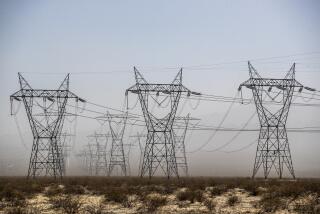State utility regulators to focus on safety after lapses
SACRAMENTO — Amid safety lapses across California, state regulators are getting tough with the state’s power companies.
And leading the charge is Michael Picker, who was named by Gov. Jerry Brown this week to be president of the powerful California Public Utilities Commission. Picker vowed to make public safety his priority.
He said that as head of the 1,000-person agency based in San Francisco, he would move quickly to create a PUC field investigative team and to designate an internal safety advocate as well as external advisors, possibly from the University of California.
Since he was first appointed to the five-member PUC almost a year ago, Picker has taken a leading role in getting commission approval of new programs to boost enforcement for violations of electric transmission and rail safety rules.
During his first days on the commission, Picker showed that he meant business about safety. He took to the steps of the PUC headquarters and handed out orange leaflets to staff members and the public as they came and went.
“Safety does not happen by accident,” the flier read. “If you see a safety hazard and don’t think it has received attention, call or text Michael Picker at 916-425-2131.”
The PUC regulates natural gas and electric companies, some telecommunications, intrastate rail, ride sharing and other services.
Picker said he’s operating on a mandate from the governor “to make things work” at the scandal-plagued PUC. The commission has been battered with criticism about its lax safety oversight, its handling of shutdown costs at the San Onofre nuclear power plant near San Clemente, and too-close relationships among some commissioners, top PUC staffers and regulated utilities, notably Pacific Gas & Electric Co. of San Francisco.
Consumer groups and lawmakers complain that PUC proceedings are too legalistic, lengthy and opaque.
Deficiencies in the PUC’s safety programs became starkly evident in September 2010 when a PG&E natural gas transmission line exploded in the San Francisco suburb of San Bruno. The blast killed eight people, injured 66 and leveled 38 homes.
Picker and the PUC — often seen as a timid regulator responding slowly and bureaucratically to urgent public safety concerns — are taking steps to respond to public calls for quicker and firmer enforcement actions.
Responding to the Legislature’s passage of a new law, the commission this month approved a safety program authorizing field inspectors to issue citations with penalties of up to $50,000 a day for violations involving electric utility “misbehavior or illegal conduct.”
The fines can be levied on the state’s three regulated electric companies: PG&E, Southern California Edison Co. of Rosemead and San Diego Gas & Electric Co.
The new rule expands upon a program for natural gas utilities passed three years ago.
In the past, the PUC had only two ways to deal with safety violations: either issue a largely slap-on-the-wrist “notice of violation” or open a complex legal proceeding that could generate reams of testimony from scores of witnesses and involve dozens of lawyers.
Even now, four years after the accident, the commission has still not levied a fine for the San Bruno explosion.
The new electric utility citation program is aimed at giving PUC staff the power to crack down on safety violations before they turn into disasters, Picker said.
“This is certainly an important step along the way to having what most people would recognize is a real enforcement program,” said Picker, 62, who moved to Sacramento from Echo Park in 1974 after graduating from Immaculate Heart College in Los Angeles. He said he initially went to work for Brown as a clerk in the mail room from 1975 to 1977, during the four-term governor’s first term in office.
A citation program, had it existed earlier, would have been helpful for quickly resolving a number of dangerous incidents involving the electric grid, a PUC administrative law judge wrote.
“The potentially hazardous nature of electrical supply facilities is not speculative,” the agency said in its final ruling. “There have been a number of incidents in the past decade involving electrical supply facility failures.”
In approving the new fines, the PUC pointed to a number of recent electrical cases. They included a 2012 incident in Whittier that caused a fatality after a power line broke, allegedly because of an untrimmed tree. The same year, a child suffered burns in Ridgecrest in Kern County after a bird caused an overhead conductor to fail.
In 2011, three people were electrocuted in an incident on Acacia Avenue in San Bernardino. An electrical conductor broke and fell to the ground, the PUC said.
Being able to immediately issue citations should make the PUC “more nimble, more immediate and more focused on solving these things by our field staff rather than going up to the commission level,” Picker said.
The job now is to train engineers at the PUC to be more aggressive, he said, because “we are really good regulators — but not really good at patrolling the beat.”
Full-scale investigative proceedings “are very time-consuming,” said Liza Malashenko, the PUC’s deputy director of the Safety and Enforcement Division. Citations, she added, are a quicker way to handle smaller but still important cases.
For example, it took PUC inspectors only eight months to fully investigate and cite PG&E and issue an almost $11-million fine for a March 3 natural gas explosion that destroyed a house in Carmel-by-the-Sea. The accident caused no deaths or injuries. PG&E is appealing the fine.
The $50,000-a-day, per-violation fines “could build up very fast,” Malashenko said.
Over the last three years, the agency has issued about $36 million in fines to PG&E for natural gas safety violations. It also handed a $150,000 fine to Southern California Gas Co. for missing a required pipeline leak inspection, which is under appeal.
In formal comments, electric utilities said they supported the commission’s efforts to enhance public safety. However, PG&E suggested that citations should be used only for “significant safety issues” and asked for a cap on total fines. Edison and San Diego Gas & Electric made similar arguments.
Allowing PUC field inspectors to act immediately when they find safety problems is an efficient use of limited manpower, said state Sen. Jerry Hill (D-San Mateo), the author of 2013 legislation that directed the PUC to issue citations.
“Some of these investigations, especially when there are fatalities, take two years or longer to conclude,” Hill said. “When there’s an injury or death, you want a prompt investigation.”
Twitter: @MarcLifsher







